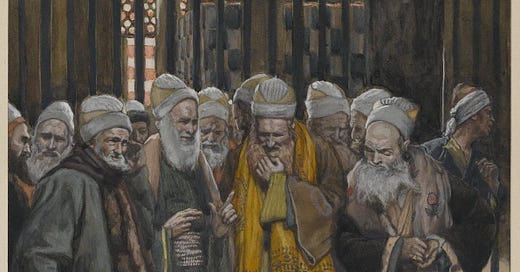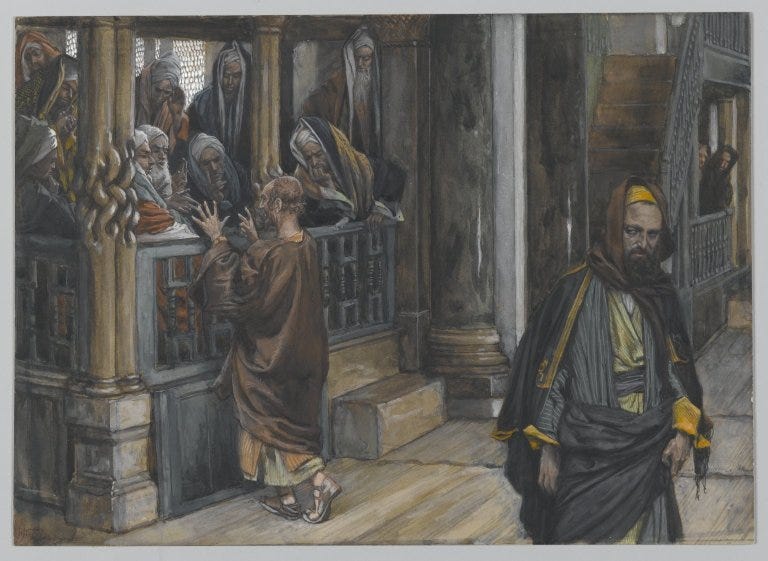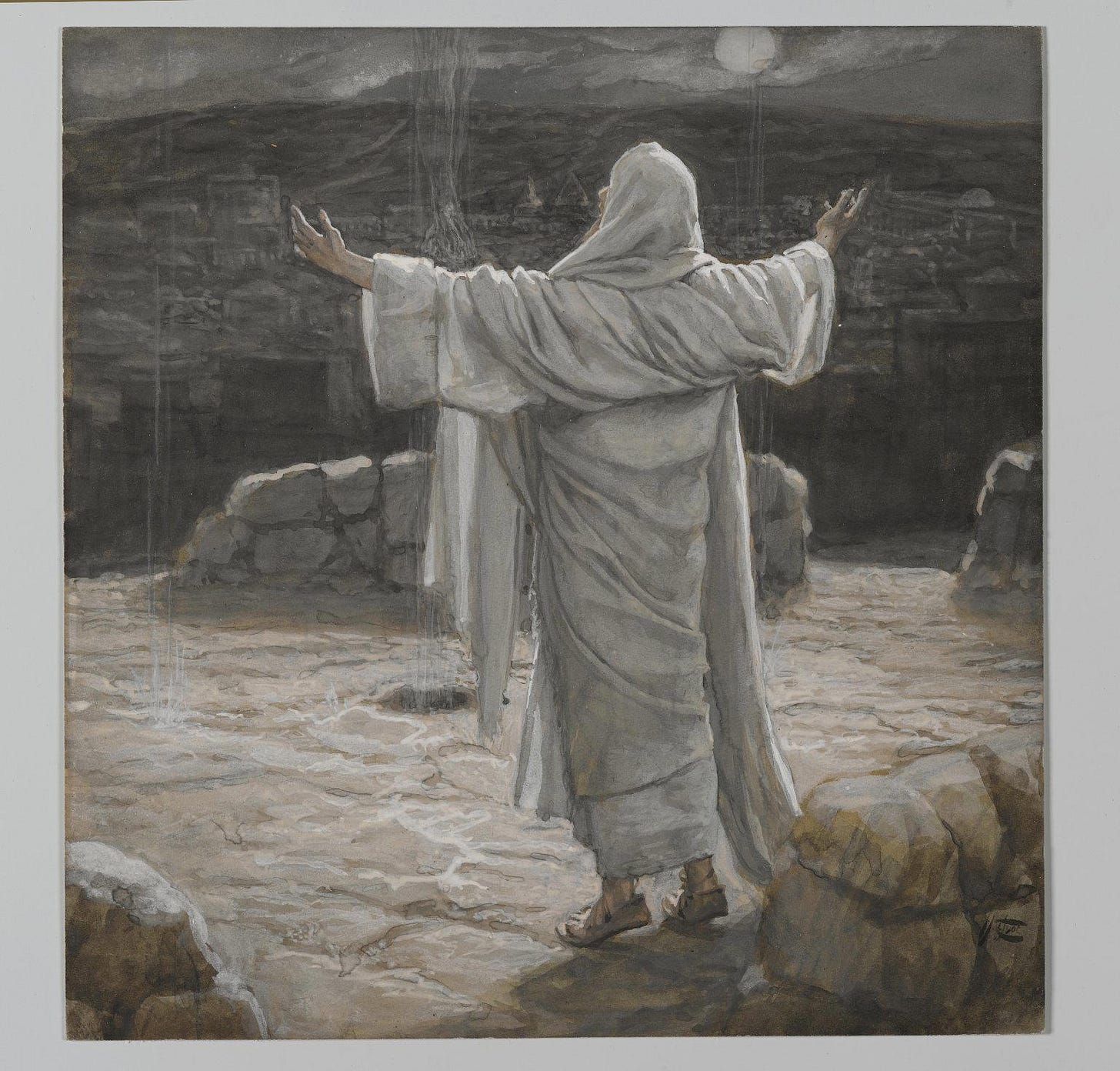Spy Wednesday
Wednesday of Holy Week with Illustrations By James Tissot, with Commentary by Dom Guéranger and Tissot
Three Illustrations for Wednesday
Spy Wednesday gets its name because on this day Judas betrayed Jesus to the Sanhedrin.
The Jews Conspire Together
Judas Goes to the Chief Priests
Christ Going to the Mount of Olives at Night
From Dom Guéranger's The Liturgical Year
The chief priests and the ancients of the people have met to-day in one of the rooms adjoining the temple, for the purpose of deliberating on the best means of putting Jesus to death. Several plans are discussed. Would it be prudent to lay hands upon Him at this season of the feast of the Pasch, when the city is filled with strangers, who have received a favourable impression of Jesus from the solemn ovation given to Him three days back? Then, too, are there not a great number of the inhabitants of Jerusalem, who took part in that triumph, and whose enthusiastic admiration of Jesus might excite them to rise up in His defence? These considerations persuade them not to have recourse to any violent measure, at least for the present, as a sedition among the people might be the consequence, and its promoters, even were they to escape being ill-treated by the people, would be brought before the tribunal of the Roman governor, Pontius Pilate. They therefore come to the resolution of letting the feast pass quietly over, before apprehending Jesus.
But these blood-thirsty men are making all these calculations as though they were the masters. They are, if they will, shrewd assassins, who put off their murder to a more convenient day: but the divine decrees, which from all eternity have prepared a Sacrifice for the world’s salvation, have fixed this very year’s Pasch as the day of the Sacrifice, and to-morrow evening the holy city will re-echo with the trumpets which proclaim the opening of the feast. The figurative lamb is now to make way for the true one; the Pasch of this year will substitute the reality for the type; and Jesus’ Blood, shed by the hands of wicked priests, is soon to flow simultaneously with that of victims, which have been hitherto acceptable to God only because they prefigured the Sacrifice of Calvary. The Jewish priesthood is about to be its own executioner, by immolating Him, whose Blood is to abrogate the ancient Alliance, and perpetuate the new one.
But how are Jesus’ enemies to get possession of their divine Victim, so as to avoid a disturbance in the city? There is only one plan that could succeed, and they have not thought of it: it is treachery. Just at the close of their deliberations, they are told that one of Jesus’ disciples seeks admission. They admit him, and he says to them: 'What will you give me, and I will deliver Him unto you?’[1] They are delighted at this proposition: and yet, how is it that they, doctors of the law, forget that this infamous bargain between themselves and Judas has all been foretold by David, in Psalm cviii? They know the Scriptures from beginning to end: how comes it that they forget the words of the Prophet, who even mentions the sum of thirty pieces of silver?[2] Judas asks them what they will give him; and they give him thirty pieces of silver! All is arranged; tomorrow, Jesus will be in Jerusalem, eating the Pasch with His disciples. In the evening He will go, as usual, to the garden on Mount Olivet. But how shall they, who are sent to seize Him, be able to distinguish Him from His disciples? Judas will lead the way; he will show them which is Jesus, by going up to Him and kissing Him!
Such is the impious scheme devised on this day, within the precincts of the temple of Jerusalem. To testify her detestation at it, and to make atonement to the Son of God for the outrage thus offered Him, the holy Church, from the earliest ages, has consecrated the Wednesday of every week to penance. In our own times, the fast of Lent begins on a Wednesday; and when the Church ordained that we should commence each of the four seasons of the year with fasting, Wednesday was chosen to be one of the three days thus consecrated to bodily mortification.
The Jews Conspire Together
St. Mark 14: 1-2
After two days was the feast of the passover, and of unleavened bread: and the chief priests and the scribes sought how they might take him by craft, and put him to death.
But they said, Not on the feast day, lest there be an uproar of the people.
Tissot Commentary
The death of Jesus had long been decided on; indeed, ever since His miracles had grown so striking and His popularity had appeared to become a menace to the authority oj the Chief Priests, the latter had determined to destroy Him. The question now was not, therefore, as to His fate but as to the best means of securing His person without causing a tumult amongst the people. Once in their hands He could not escape, for, in the case of a judicial sentence being found impossible, these men would not have hesitated to assassinate Him privately. In any case, however, they judged it prudent to put off the execution of Jesus until after the celebration of the feast, for fear of trouble with the assembled crowds. Under certain circumstances, the carrying out of legal sentences was put off until the concourse of pilgrims should add to the solemnity, but in this case the very sacredness of the time would have constituted a danger, more especially as the chief partisans of Jesus were amongst the turbulent and sturdy Galileans, ever ready for a conflict, and it was no rare thing in Judea for riots to take place during the great festivals. The postponement of the execution was therefore voted, but it was at the same time determined to watch for a favorable opportunity for an early arrest. After all, these resolutions came to naught, because Jesus was put to death just at the most solemn moment of the feast and therefore,with thegreatest possible éclat. The Sanhedrim, in fact, doubtless perceived that the popularity of Jesus had not such deep root as they had thought, and the defection of one of the twelve confirmed them in this opinion. They therefore reverted to their original idea and determination to give to their victory all the noisy celebrity for which their hatred craved.
Judas Goes to the Chief Priests
St. Mark 14: 10-11
AND Judas Iscariot, one of the twelve, went unto the chief priests, to betray him unto them.
And when they heard it, they were glad, and promised to give him money. And he sought how he might conveniently betray him.
Christ Going to the Mount of Olives at Night
St. Luke 21:37
AND in the day time he was teaching in the temple; and at night he went out, and abode in the mount that is called the mount of Olives.
Tissot Commentary
We have seen that when Jesus was in Galilee He often retired at night to some lofty place to pray; when He was in Judea He continued to do the same, and the Evangelists speak of the Mount of Olives as His retreat when night fell. This choice of special localities remarkable for their height and isolation is a striking peculiarity in the life of Our Lord, but it was also a traditional fewish custom to pray in elevated spots, because height was alike symbolic and provocative of the aspirations of the Spirit. Jesus, Whose life was one long prayer. and Who needed no stimulus to lead Him to long after God with His whole soul, was yet willing to comply with what were to a certain extent the requirements of ritual, and to encompass about His solemn devotions with the solemnity of the mountains and of the night. May we not suppose, in spite of the silence of the Evangelist, that in these days so near the death of the Master, the Mount of Olives was not the only height which witnessed His petitions? Near to it there was a spot from which also He could behold the beloved city and which must have attracted Him more than any other, for that spot was Golgotha, where He was so soon to complete His 'work. May not Jesus have gone there secretly to pray and to commune with His Father in some mysterious way? May not His soul have been wrapt in an intensely profound meditation, offering up to God in anticipation the approaching sacrifice and mentally rehearsing, as in a realistic vision, the coming scene, so fraught alike with gloom and consolation? We realty seem to be justified in imagining something of the kind, for Jesus, in that He was the Son of God as well as the Son of man. could see into the future: now the future for Him, the future of to-morrow was the cross, the cross and Calvary! How could His soul escape a vision, recurring, perhaps some twenty times, of the rising up of that cross? How could His feet help being drawn in the direction where it was so soon to be set up?










